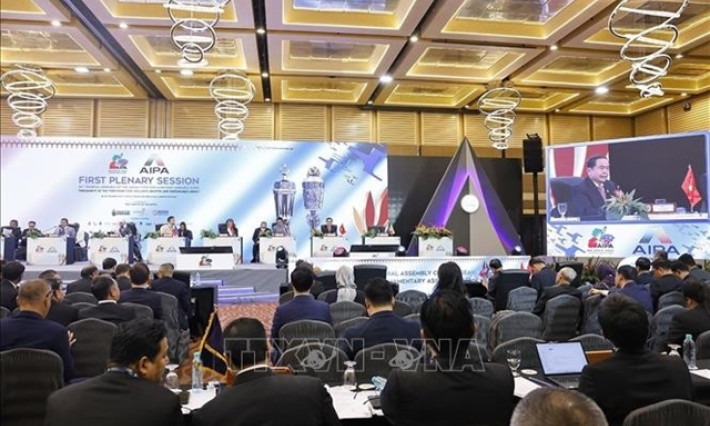European business confidence at highest since 2022
The European Chamber of Commerce in Vietnam’s (EuroCham) most recent Business Confidence Index reached 52.8 points in the first quarter (Q1) of 2024, which is its highest level since Q3 2022 and a clear sign of increased confidence within Vietnam’s European business community.
Sent to EuroCham's network of over 1,400 members, the BCI gathers responses to gauge the prevailing mood among European businesses operating in Vietnam, delivering real-time observations on the ever-evolving dynamics of the vibrant Southeast Asian market.
"This positive trend underscores the European business community's view of Vietnam as a dynamic market with promising growth prospects,” said Dominik Meichle, chairman of EuroCham.
"The index once again rising above the 50 threshold reaffirms the country's growing appeal. Continued efforts to enhance stability and predictability will further strengthen Vietnam's global competitiveness and unlock its full potential."
European businesses signal a strong likelihood of recommending Vietnam as a top investment destination.
A significant 54 per cent of those surveyed indicated a high likelihood of recommending the country to other foreign businesses, giving ratings of 8 or above out of 10. This highlights Vietnam's rapidly growing appeal within the European business community, while also suggesting the potential to increase its attractiveness to investors.
"The hard data from the Business Confidence Index paints a clear picture - investor optimism is steadily improving," said Decision Lab CEO Thue Quist Thomasen. "Vietnam certainly has the capacity to become the region's pre-eminent investment destination, and proactive, investor-focused policies will further accelerate its rise.”
In addition, European businesses express optimism about Vietnam's economy, both in the near and long term. While a third of businesses feel optimistic about their individual Q2 outlooks, and nearly 40 per cent are neutral, several key indicators point towards a promising trajectory.
Specifically, sentiment shifted positively for the upcoming quarter. Optimism is up 6 points from last quarter to 45 per cent, while pessimism is only 10 per cent.
Over half of respondents anticipate higher orders and revenues in Q2/2024. Meanwhile, 40 per cent of businesses plan to expand their workforce in Q2. The reduction of the number of firms planning to cut spending in the upcoming quarter, now just 15 per cent compared to the previous 23 per cent, indicates a boost in investment confidence.
Looking to the long term, this optimism strengthens, with 71 per cent of businesses feeling positive about their long-term prospects in Vietnam over the next five years.
Vietnam's skilled workforce is a major draw for European investors, with 75 per cent of EuroCham members hiring 76 per cent or more of their staff locally. While a Q4/2023 BCI survey found 40 per cent of businesses rating workforce proficiency as moderate, the strong hiring trend suggests a solid talent foundation for future growth.

While optimism remains high, businesses face regulatory hurdles in Vietnam that hinder market entry and long-term investment.
Over half of respondents cite administrative burdens as a major obstacle to both establishing and expanding operations. In terms of unclear regulations, 36 per cent grapple with confusing rules, creating uncertainty and impeding strategic planning. For permit and licence difficulties, 28 per cent experience costly delays in obtaining approvals, discouraging new ventures and adding risk for investors. When it comes to work visa barriers, restrictive rules (26 per cent) stifle skills transfer and discourage foreign expertise and capital that drive growth.
To attract more foreign investment, businesses pinpointed several key reforms. Accordingly, 37 per cent call for streamlined procedures to ease market entry and reduce red tape. 34 per cent emphasize clear and consistent laws for a predictable investment climate. 28 per cent advocate for the enhancement of roads, ports, and bridges to support trade and logistics.
"Vietnam has tremendous economic potential, and addressing regulatory challenges is key to fully realizing it," said Meichle.
"Streamlining procedures and establishing more transparent regulations will empower both Vietnamese and foreign businesses to succeed. This will position Vietnam as a leading investment destination in the region, benefiting domestic businesses, attracting international capital, and strengthening economic partnerships."
While Vietnam continues to make progress on sustainability, the European business community faces challenges in adapting.
30 per cent of businesses find it difficult to justify eco-friendly practices due to low consumer interest. 26 per cent struggle to balance cost competitiveness with sustainability commitments, specifically citing pricing conflicts with eco-practices. 26 per cent find it difficult to comply with unclear or confusing environmental regulations. 25 per cent lack the infrastructure needed for sustainable operations, including access to renewable energy and waste management solutions.
Furthermore, European businesses are closely tracking several upcoming regulatory shifts that hold the potential to significantly reshape their operating environment.
Key areas businesses are watching include Power Development Plan (PDP) VIII, which is cited by 21 per cent of businesses. The approval of PDP8's implementation plan on April 1 could provide clarity or introduce new complexities for businesses within the energy sector.
In terms of the pharma law, 11 per cent of businesses anticipate substantial impacts from changes to the pharmaceutical regulatory framework. Meanwhile, the recent revisions to the Land Law, ratified by the National Assembly on January 18, 2024, have been noted by 7 per cent of businesses as a potential area of impact.
Businesses are also monitoring developments in the Carbon Border Adjustment Mechanism, direct power purchase Agreements, and the general data protection regulation (each cited by 5 per cent). These regulations have the potential to influence industries ranging from manufacturing to technology.
Recent disruptions in crucial shipping lanes like the Red Sea have adversely affected three out of five respondents, highlighting the vulnerability of global supply chains. This underscores the importance of Vietnam exploring all possible measures to mitigate the impact of such external risks on its economy.
While economic uncertainties, real estate headwinds, and supply chain risks pose challenges, the data shows European businesses are optimistic about near-term revival and longer-term prospects in Vietnam's ascendant market. As the country advances, the European business sector is poised to seize opportunities while advocating reforms to sharpen Vietnam's competitive edge.






